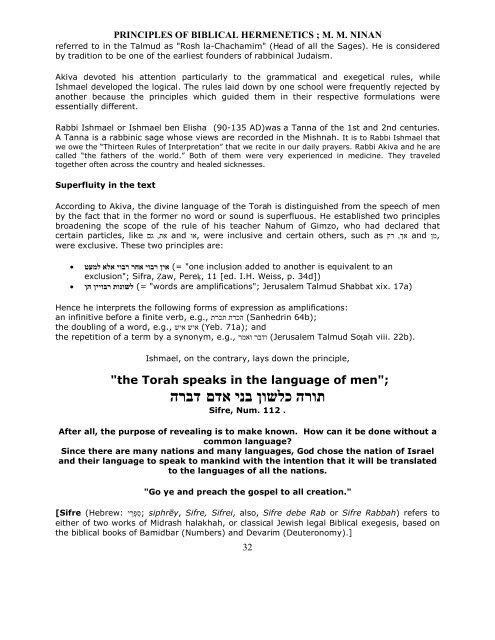Biblical Hermeneutics
Create successful ePaper yourself
Turn your PDF publications into a flip-book with our unique Google optimized e-Paper software.
PRINCIPLES OF BIBLICAL HERMENETICS ; M. M. NINAN<br />
referred to in the Talmud as "Rosh la-Chachamim" (Head of all the Sages). He is considered<br />
by tradition to be one of the earliest founders of rabbinical Judaism.<br />
Akiva devoted his attention particularly to the grammatical and exegetical rules, while<br />
Ishmael developed the logical. The rules laid down by one school were frequently rejected by<br />
another because the principles which guided them in their respective formulations were<br />
essentially different.<br />
Rabbi Ishmael or Ishmael ben Elisha (90-135 AD)was a Tanna of the 1st and 2nd centuries.<br />
A Tanna is a rabbinic sage whose views are recorded in the Mishnah. It is to Rabbi Ishmael that<br />
we owe the “Thirteen Rules of Interpretation” that we recite in our daily prayers. Rabbi Akiva and he are<br />
called “the fathers of the world.” Both of them were very experienced in medicine. They traveled<br />
together often across the country and healed sicknesses.<br />
Superfluity in the text<br />
According to Akiva, the divine language of the Torah is distinguished from the speech of men<br />
by the fact that in the former no word or sound is superfluous. He established two principles<br />
broadening the scope of the rule of his teacher Nahum of Gimzo, who had declared that<br />
אך , as were inclusive and certain others, such ,או , and גם certain particles, like<br />
were exclusive. These two principles are:<br />
את<br />
32<br />
,מן and רק<br />
"one inclusion added to another is equivalent to an (= אין רבוי אחר רבוי אלא למעט •<br />
exclusion"; Sifra, Ẓaw, Pereḳ, 11 [ed. I.H. Weiss, p. 34d])<br />
17a) "words are amplifications"; Jerusalem Talmud Shabbat xix. (= לשונות רבויין הן •<br />
Hence he interprets the following forms of expression as amplifications:<br />
an infinitive before a finite verb, e.g., הכרת תכרת (Sanhedrin 64b);<br />
the doubling of a word, e.g., איש איש (Yeb. 71a); and<br />
the repetition of a term by a synonym, e.g., ודבר ואמר (Jerusalem Talmud Soṭah viii. 22b).<br />
Ishmael, on the contrary, lays down the principle,<br />
"the Torah speaks in the language of men";<br />
תורה כלשון בני אדם דברה<br />
Sifre, Num. 112 .<br />
After all, the purpose of revealing is to make known. How can it be done without a<br />
common language?<br />
Since there are many nations and many languages, God chose the nation of Israel<br />
and their language to speak to mankind with the intention that it will be translated<br />
to the languages of all the nations.<br />
"Go ye and preach the gospel to all creation."<br />
[Sifre (Hebrew: סִפְרֵ י ; siphrēy, Sifre, Sifrei, also, Sifre debe Rab or Sifre Rabbah) refers to<br />
either of two works of Midrash halakhah, or classical Jewish legal <strong>Biblical</strong> exegesis, based on<br />
the biblical books of Bamidbar (Numbers) and Devarim (Deuteronomy).]


















